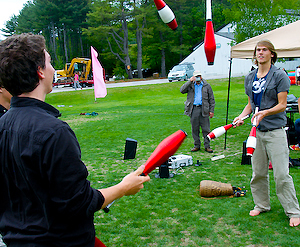In a recent blog post on the
National Association of Independent School's website, NAIS President Pat Bassett considers reasons families choose against independent schools. He specifically addresses seven "myths" commonly held by those rejecting private education. It is interesting stuff.

Myths #1 and #3 are distinct, yet related: That independent schools are only for the rich, and that they are unaffordable. Bassett cites data indicating that while private schools are chosen more often by families in upper income brackets, a significant portion of our schools' populations are comprised of students from the three lower economic quintiles, as well as the fourth quintile--middle to upper middle class families that find a way to afford tuitions whatever the sacrifice (sometimes utilizing grandparent support.)
Speaking to Myth #3, he notes that while we offer extremely expensive services (consider Proctor's 4:1 student:teacher ratio,) financial aid is a major priority, and even families with relatively high incomes can qualify for assistance. This year's Proctor student population is receiving $2,300,000 in need-based financial assistance, a figure that does not include significant tuition remission for the children of some employees.

Mr. Bassett's assessment of Myth #2, that independent schools are "not the real world" is most provocative. "Of course they are not, thank God," he writes. Independent school culture is ironically counter-cultural, he declares, claiming that we offer ethical environments that prepare students exceedingly well for college and life by running counter to the toxic, amoral and immoral society in which we live. This brings to mind research indicating that safety is a prime motivator for people choosing boarding schools.
This is an arena in which Proctor is particularly well positioned; it doesn't take much effort for prospective families to appreciate the social and ethical tone that distinguishes this community. Just attend an assembly.
Myth #4, that independent schools lack diversity, prompts more irony. A school like Proctor, which draws students from eleven nations and thirty states, may be significantly more diverse than the local suburban and rural high schools that these students might otherwise attend.

Myth #5--that boarding schools are for kids with social problems--doesn't warrant much analysis at a school where social and emotional well-being are the key criteria for admission. Number 6--that we exist just for really smart kids--fails to recognize the degree of mission differentiation that makes so many schools prosperous. In other words, we are doing well because each school is doing something different. If Proctor was committed to serving only highest achieving kids, we'd probably have been out of business long ago.

The final myth is that we fail to be a part of the community. Forgetting all of the community service that goes on (both locally and beyond,) we are the largest employer--by far--in Andover; we are the largest tax payer--by far, we contribute to local community organizations and we enroll 80 local boys and girls.

Pat Bassett concludes his blog post by observing, "For too long, independent school marketing materials...have emphasized 'features': facilities, programs, options" and predicts that real outcomes will become the future currency. In our corner of the prep school world, athletics--powerhouse teams and over-the-top facilities--has been over-valued (I believe) in neighboring schools' priorities and marketing. I believe that "features" such as Proctor's experiential programs have a legitimate place in our presentation because they illustrate commitment to a methodology of teaching and educating that sets us apart.

I want to thank Pat Bassett for writing such a bold and stimulating article.
I will be away from The Corner for at least ten days now, visiting family and friends in Wisconsin. Don't look for another page soon!




















